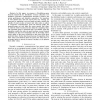Free Online Productivity Tools
i2Speak
i2Symbol
i2OCR
iTex2Img
iWeb2Print
iWeb2Shot
i2Type
iPdf2Split
iPdf2Merge
i2Bopomofo
i2Arabic
i2Style
i2Image
i2PDF
iLatex2Rtf
Sci2ools
133
click to vote
GLOBECOM
2006
IEEE
2006
IEEE
Stackelberg Game for Distributed Resource Allocation over Multiuser Cooperative Communication Networks
— In this paper, we propose a Stackelberg game theoretic framework for distributive resource allocation over multiuser cooperative communication networks to improve the system performance and stimulate cooperation. Two questions of who should relay and how much power for relaying are answered, by employing a two-level game to jointly consider the benefits of source nodes as buyers and relay nodes as sellers in cooperative communication. From the derived results, the proposed game not only helps the source smartly find relays at relatively better locations but also helps the competing relays ask reasonable prices to maximize their own utilities. From the simulation results, the relays in good locations or good channel conditions can play more important roles in increasing source node’s utility, so the source would like to buy power from these preferred relays. On the other hand, because of competition from other relays and selections from the source, the relays have to set proper ...
Related Content
| Added | 11 Jun 2010 |
| Updated | 11 Jun 2010 |
| Type | Conference |
| Year | 2006 |
| Where | GLOBECOM |
| Authors | Beibei Wang, Zhu Han, K. J. Ray Liu |
Comments (0)

